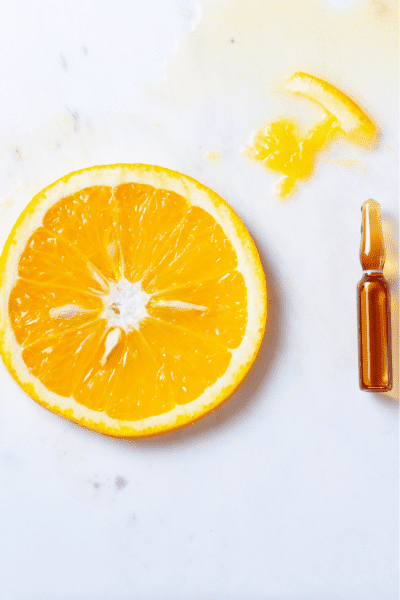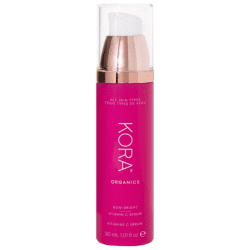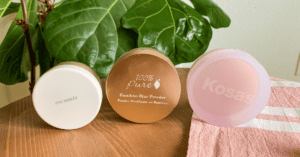Vitamin C Serum Side Effects and Benefits (Read Before You Try!)
Learn about the side effects of Vitamin C serums before adding one to your skincare routine!
Are you wondering about Vitamin C serum side effects? Vitamin C serums seem to be all the rage right now – and rightfully so! There are so many benefits to adding a serum to your skincare routine.
But before you jump in, you should know that for some people, there are side effects to using a serum.
In this article, I’ll share the most common side effects and help you decide if you should use one!
This post contains affiliate links. You can learn more here.
Pin this image for later!

What are the Benefits of Vitamin C for Skin?
But first, let’s talk about why you might want to consider using a serum. Vitamin C is just as good for your skin health as it is for your body.
In fact, if you want healthy skin, it is a good idea to increase your Vitamin C intake and nourish your skin from the inside out. You can do this by drinking orange juice, eating more citrus fruits, as well as broccoli, tomatoes, and peppers.
But adding a topical serum to your skincare routine can give you a more youthful glow as well! That’s the main reason vitamin C serums are getting popularized right now.
Vitamin C Helps Reduce Redness
We all know that Vitamin C is good for our immune system, but did you know that it also has anti-inflammatory properties?
In fact, according to the Journal of Cosmetic Dermatology, it can help prevent acne. It also improves your elastin and collagen synthesis, which in turn reduces inflammation. In fact, topical Vitamin C can help you heal faster!
Vitamin C serums help reduce inflammation, redness, and acne, while visibly brightening your skin.
Vitamin C Serums Can Even Out Your Skin Tone
A review in the National Library of Medicine (NLM) found that Vitamin C helps protect your skin barrier, keeping irritants out and water in! This, in turn, keeps your skin plump and hydrated, reducing skin aging, wrinkling, and an uneven skin tone.
It gives your skin a smooth, glowing complexion. And with most people suffering from blotchy skin thanks to the chemicals in our beauty routines (among other reasons), this is a welcome fix!
By the way, if you’re looking to switch to a non-toxic beauty routine but have no idea where to start, check out my ebook! It’s the exact roadmap to becoming a clean beauty guru. Click the banner below to check it out!
Vitamin C Helps Fade Hyper-pigmentation
A topical Vitamin C also helps fade dark spots on your skin. These spots are called ‘hyper-pigmentation’.
Hyper-pigmentation is any spot on your skin that has a darker skin tone than the rest of your skin. This could be things like age spots or sunspots. It happens because there is too much melanin production in that spot.
According to one NLM study, Vitamin C reduced hyper-pigmentation in 73% of study participants who applied it to their skin, along with a sunscreen and malic acid. Malic acid is an alpha hydroxy acid used to clear away dead skin cells.
Vitamin C inhibits the melanin production in your skin. It also provides a natural, mild exfoliant, which can help whisk away the dead skin. This process helps to brighten your skin.
Vitamin C May Help Prevent Sagging Skin
Vitamin C gives you firmer, toned, more healthy skin. It’s an antioxidant, so it helps prevent free radicals from forming, and breaking down your collagen and elastin.
Free radicals are molecules that are produced when the body is exposed to pollutants, like UV rays and smoke. When your collagen levels drop, your skin begins to wrinkle and sag.
Not only does it help neutralize free radicals, but one study found that Vitamin C actually boosts collagen production and smooths out fine lines and wrinkles.
Vitamin C Can Soothe Sunburns
A serum can help protect your skin from UV rays, and it can help you heal faster, if you do get burned.
Since Vitamin C fights the free radicals that cause sun damage from UV rays, it offers some protection from the sun. And it is anti-inflammatory, so it helps your skin to heal faster.
Vitamin C accelerates the process of replacing damaged cells with healthy skin cells, which also speeds up healing. All in all, using Vitamin C gives you younger, more youthful looking skin!

What are the Side Effects of Vitamin C Serum?
With all of the benefits of using a serum, it’s really hard to imagine that there could be any negative side effects! But if you have sensitive skin, you may want to forgo this skincare product.
Plus, there are some skincare ingredients that you just don’t want to mingle with Vitamin C. The combos cause more harm than good!
Vitamin C Serum Can Cause Skin Irritation
Most people have absolutely no issues with using a serum. But a few people, specifically those with sensitive skin, do have some skin irritation.
If you have sensitive skin, you may experience:
- Itching
- Redness
- Stinging
- Tingling
- Dryness
- Burning
Some people may also notice their skin has turned slightly yellow. Like I said, these side effects are typically rare. But if you do have sensitive skin, I’d recommend taking it slow.
Do a patch test first, under your arm, to be sure you don’t have an allergic skin reaction there. And start out slow, using a product with a lower concentration of Vitamin C.
A 2017 study found that people tend to have a reaction if the concentration of Vitamin C is higher than 20%. You can find serums with concentration levels anywhere from 5% to 20%, so err on the side of caution if this is your first time using one.
Vitamin C Serum Can React with Other Skin Care Ingredients
If you have a reaction to the Vitamin C, there’s a good chance that you mingled two ingredients that shouldn’t go together.
These serums have so many ingredients in them! It is possible that they could interact with each other and cause an allergic reaction on your skin. So, again, if you have sensitive skin, take it slow and do a skin test before using it.
Also, some other skin care products in your daily skin care routine could react to the Vitamin C, causing a reaction for you. There are a few products you do not want to use directly after using a serum.
But we’ll go into that more in the frequently asked questions below.
Frequently Asked Questions
There are a lot of questions surrounding these serums. I’ll do my best to answer all of them, but if I should miss one, share it in the comments below.
Can I Use Vitamin C Serum Everyday?
Yes, you can use it every day. Consistency is key.
Use it every morning, or every evening – or both! Some people like the added protection it offers during the day, while others like the added benefit of damage repair at night.
If you are worried about a reaction, though, I’d start with every other day, and slowly build up to once or twice a day.
Also, maybe start with a nightly application, because if you do have a reaction, it’ll be less noticeable while you sleep.
And if you need help getting a good skin care routine in place, I’ve got just the thing with my post on skin care for beginners!
How do I Use Vitamin C Products?
Okay, so there’s a lot to unpack here. When you are shopping for a serum, there are a few things you want to pay attention to:
- The form of Vitamin C used in the product
- The Vitamin C concentration levels
- The other ingredients in the product
- Your daily beauty routine
Let’s take a closer look at each one.
Look for the right form of Vitamin C
The most important thing to pay attention to is what form the Vitamin C takes, in your serum. Some are better than others.
Vitamin C level is usually referred to as L-ascorbic acid or ascorbic acid on the label. But there are also many other forms of Vitamin C.
- L-ascorbic Acid (LLA) – this is Vitamin C in its most potent and effective form. However, it is also less stable than other forms of Vitamin C, so if you have sensitive skin, LLA might not work for you.
- Magnesium Ascorbyl Phosphate – this is more stable, and better for dry or sensitive skin.
- Ascorbyl Palmitate – also a more stable form. It works great if you need to repair damaged skin.
- Ascorbic Glucosamine – this is a derivative of Vitamin C that is often used for its antioxidant and skin-brightening properties, so it’s great for reducing dark spots.
- Tetrahexyldecyl Ascorbate – this form is more stable than the others, and it penetrates the skin easier.
- Sodium Ascorbyl Phosphate – this form is gentle on the skin, so it might be a good option if you have sensitive skin.
If your skin can handle it, I’d go with LLA. It is the most naturally occurring, the most effective, and the most studied. Because of this, it is the most common form of Vitamin C used in skincare products.
But, if you have sensitive skin, you may want to avoid products with LLA in them. I’d go with a magnesium ascorbyl phosphate then because it is less likely to irritate your skin.

Look at the Concentration Level
The next thing you should pay attention to is the concentration level in the serum. Some serums are stronger than others.
As we talked about above, people tend to react to concentration levels higher than 20%. A study from The Journal of Clinical and Aesthetic Dermatology found an 8% concentration level to be clinically significant, meaning you need at least that, to be effective.
So, consider starting at 8% and working your way up to 20% if you have no reaction.
Look for These Additional Ingredients in the Serum
There are some ingredients that can help the Vitamin C be even more effective.
- Vitamin E – it helps to deliver the Vitamin C more effectively, according to this study. It works with Vitamin C to fight free radicals and support the skin’s natural barrier.
- Ferulic Acid – it helps to boost collagen production and stabilize Vitamins E and C. It also helps fight free radicals and keeps the Vitamin C from irritating your skin.
- Hyaluronic Acid – this little powerhouse compliments Vitamin C quite nicely, by helping your skin to stay hydrated, diminishing the appearance of fine lines and aging. My favorite hyaluronic acid serum is this one by Osea
If you can find a serum with one or more of these ingredients, I’d grab it.
How to apply the Serum
After you find the right serum, you need to apply it correctly. The general rule of thumb is to start thin and go thick.
That means you start with your thinnest product first, so that it has a chance to absorb into your skin. And then you move to your thickest, last. I go into more detail on this in my skin care post.
Here’s how:
- First gently cleanse your face and pat it dry.
- Apply toner, if used.
- Gently apply a small amount of the serum to your face and neck. A little bit goes a long way!
- Finish with your regular moisturizer.
You definitely want to do a test run first on your arm. If you don’t experience redness, or break out in a rash or hives, you are good to go!
I do need to mention that some people might experience their skin turning orange. This is because Vitamin C oxidizes quickly. If your skin turns colors, it’s because it had the chance to oxidize while you were applying it.
Applying your moisturizer afterwards should help prevent this. That’s why the order of products is key!
If you are ready to try a Vitamin C serum, I recommend Kora Organics’ Noni Bright Vitamin C Serum. This serum is made from natural ingredients, and ascorbyl glucoside, which is a derivative of L-ascorbic acid. Ascorbyl glucoside is gentler than LLA, though.

What happens if You Use too Much Vitamin C Serum?
It’s really hard to overdose, unless you are prone to sensitive skin.
But, if you have a reaction, it is too much. So, if you experience dryness, redness, itching, burning, or stinging, you may be using too much.
If you suddenly break out in blackheads, that could signal an overdose of Vitamin C as well.Check your concentration level – is it too high?
Also back off on how often you are applying the serum. If you use it every morning and every night, try just one or the other. I recommend the morning!
If you use it once a day, try every other day. It’s all about finding what works best for you! Your skin should feel good after using Vitamin C. If it doesn’t, it may not be for you.
When Should I Avoid Vitamin C Serum?
There are a few instances in which you should avoid using Vitamin C serums.
- If you experience an allergic reaction, you should discontinue use.
- If you are allergic to Vitamin C, you should not use a serum.
- If you use a chemical exfoliator, you should not use a topical Vitamin C serum, because its effectiveness is significantly reduced when exposed to a chemical exfoliator.
There are a few other products that you do not want to mix with a serum. Anything containing retinol, niacinamide, retinoids, or benzoyl peroxide should not be used with Vitamin C.
What Should You Not Use After Vitamin C Serum?
Okay, so if you are going to use a serum, there are some skincare ingredients that you do not want to use immediately after the serum.
- AHAs and BHAs, such as glycolic, salicylic, and lactic acids – vitamin C is an acid, too. And it’s unstable. If you combine it with these acids, the Vitamin C is pretty much useless. You might as well be throwing your money away because it’s not going to do anything.
- Retinol – retinol and Vitamin C are both active ingredients. They both promote collagen production and aide cell turnover. Using them together can cause skin irritation. If you choose to use retinol, it’s better to use the serum in the morning and the retinol in the evening. Retinol is a synthetic derivative of Vitamin A, however, so if you are transitioning to clean beauty, you may want to stay away from retinol.
- Niacinamide – while both ingredients are used to improve acne, together they can actually trigger breakouts. It’s best to use them at least ten minutes apart.
- Benzoyl peroxide – benzoyl peroxide will oxidize the Vitamin C, making it useless.
If you use a product that has any of these ingredients in it, I’d wait at least 30 minutes after using the serum before applying it. It might be better to do one in the morning and the other in the evening, just to be sure the ingredients don’t interact with each other.
What is the Correct Way to Store Vitamin C Serum?
Vitamin C breaks down when exposed to air and light, so you’ll want to keep your serum in a cool, dark place. If you’ve noticed, your serum always comes in a darkly colored bottle, as well. That’s to prevent oxidization from the light.
A bathroom cabinet, away from extreme heat, is a good idea. If your serum has changed colors, or darkened, it’s probably no good. It’s likely oxidized and no longer effective.
Final Thoughts on Vitamin C Serum Side Effects
Vitamin C serums can give you healthier, youthful looking skin.
If you are ready to try a serum, start out slowly, especially if you have sensitive skin. Start with every other day, and only once a day, and work your way up to twice a day.
Also start with a lower concentration of Vitamin C, such as 8%. If you are worried about a reaction, I’d look for a product with magnesium ascorbyl phosphate in it. If you aren’t worried, L-ascorbic acid is probably your best bet.
If you try a Vitamin C serum, let me know what you think in the comments below!
Related to Vitamin C Serum
How to Start Your Clean Beauty Transition Without Losing Your Mind
How to Buy Clean Beauty on a Budget and Still Have Money for Groceries
A Quick Guide to Starting a Natural Skin Care Routine for Beginners
10 Affordable Clean Beauty Products that Are Actually Worth It
What is the Clean Beauty Movement and How Does It Affect Me?







